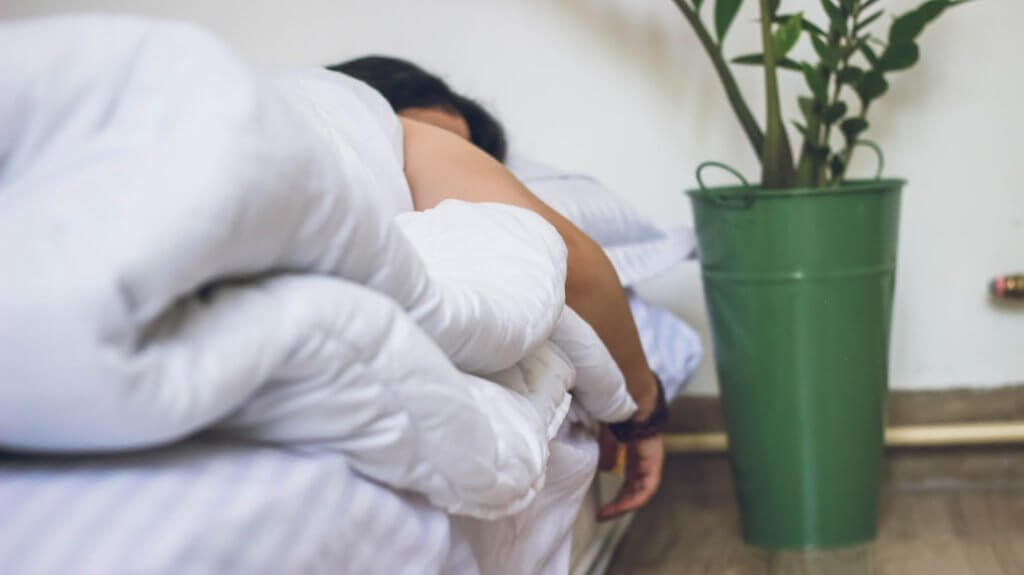 Sleep is a vital component of overall wellbeing and mental health, yet many of us struggle to get the rest we need. Getting enough quality sleep is essential for overall wellbeing, both physical and mental. Lack of sleep can lead to a mental breakdown, with symptoms such as irritability, depression, and anxiety. It can also affect sexual health, leading to reduced libido and a decrease in fertility.
Sleep is a vital component of overall wellbeing and mental health, yet many of us struggle to get the rest we need. Getting enough quality sleep is essential for overall wellbeing, both physical and mental. Lack of sleep can lead to a mental breakdown, with symptoms such as irritability, depression, and anxiety. It can also affect sexual health, leading to reduced libido and a decrease in fertility.
People often prioritise sleep over sex, as it is seen as more important for overall wellbeing. Women seem to need more sleep than men. It is better to get fewer hours of quality sleep than more hours of interrupted sleep. There are tips and techniques that can help people get better quality sleep, such as avoiding caffeine before bedtime and exploring using popular sleep app music. Through this blog, we hope to provide readers with a comprehensive guide to quality sleep for mental health.
How does getting enough quality sleep affect overall wellbeing?
Getting enough quality sleep is essential for overall wellbeing. Sleep helps the body to rest and recharge, allowing it to function optimally. Quality sleep also helps to reduce stress levels, improve mood, and increase energy levels.
Studies have shown that getting enough quality sleep can help to improve cognitive functioning, memory recall, and decision-making. Quality sleep also helps to boost the immune system, reduce inflammation, and improve overall physical health. Additionally, getting enough quality sleep can help to regulate hormones and improve mental health.
Getting enough quality sleep can also help to reduce the risk of developing chronic diseases such as diabetes, heart disease, and obesity. Quality sleep can also help to reduce the risk of depression and anxiety. Finally, getting enough quality sleep can help to improve overall productivity and performance in daily activities. Therefore, getting enough quality sleep is essential for overall wellbeing.
Can lack of sleep cause a mental breakdown?
Yes, lack of sleep can contribute to mental health issues such as anxiety, depression, and even a breakdown. Poor sleep can lead to an inability to concentrate, decreased motivation, and irritability, all of which can contribute to a mental breakdown.
How does getting enough quality sleep affect sexual health?
Getting enough quality sleep is essential for maintaining sexual health.
- Poor sleep can lead to a decrease in libido and a decrease in the quality of sexual experiences. When people do not get enough sleep, their bodies produce less testosterone, which is a hormone that is important for sexual desire. Additionally, poor sleep can lead to fatigue, which can make it difficult to stay aroused during sexual activities.
- When people get enough quality sleep, their bodies produce more testosterone, which helps to increase libido and improve sexual performance. In addition, getting enough quality sleep helps to reduce stress and anxiety, which can interfere with sexual arousal and satisfaction. People who get enough quality sleep are also more likely to have higher energy levels, which can help them stay engaged during sexual activities.
- Getting enough quality sleep can help to improve overall physical health, which can also have a positive effect on sexual health. People who are physically fit tend to have higher libidos and better sexual performance than those who are not as physically fit. Additionally, people who get enough quality sleep tend to have better cardiovascular health, which can help them stay aroused longer during sexual activities.
Why do people prioritise sleep above sex?
People prioritize sleep above sex for a variety of reasons.
- Sleep is essential for our physical and mental health. Without adequate sleep, our bodies cannot function properly and our minds become foggy and unfocused. Additionally, sleep helps to restore our energy levels, allowing us to perform better in all aspects of life.
- Sex can be physically and emotionally draining. While it can be a pleasurable experience, it can also be exhausting and leave us feeling drained and tired. This can make it difficult to focus on other tasks or activities that require energy and focus.
- Sex can also be a source of stress for some people. This can be due to a variety of factors such as performance anxiety, fear of rejection, or worries about the consequences of engaging in sexual activity. For these reasons, people may prioritize getting a good night’s sleep over having sex in order to reduce stress and feel more energized the next day.
Why do women seem to need more sleep than men?
Women need more sleep than men for a variety of reasons.
- Women tend to have a higher sleep requirement than men due to their biological makeup. Women have a greater need for sleep because their bodies produce more melatonin, a hormone that helps regulate the body’s sleep-wake cycle. This means that women are more likely to feel sleepy and require more sleep in order to feel rested.
- Women often have more responsibilities than men, which can lead to higher levels of stress and fatigue. Women are more likely to take on multiple roles such as caregiver, employee, and homemaker, all of which can lead to increased levels of stress and fatigue. This can cause women to need more sleep in order to cope with the demands of their daily lives.
- Women tend to experience hormonal fluctuations throughout the month due to their menstrual cycle. These fluctuations can lead to changes in energy levels, mood, and sleep patterns. During certain times of the month, women may need more sleep in order to cope with the hormonal changes and maintain their energy levels.
Overall, women need more sleep than men due to their biological makeup, increased responsibilities, and hormonal fluctuations. By getting enough restful sleep each night, women can help ensure they have the energy they need to take on the day.
What are the best times to sleep?
The best times to sleep are between 7p.m. and 10p.m. This is when your body is naturally winding down and preparing for sleep. It is also important to get at least 7 – 9 hours of sleep each night.
Which is better – more hours of interrupted sleep or less hours of quality sleep?
It is better to get less hours of quality sleep than more hours of interrupted sleep. Quality sleep is more important for overall health and well-being than quantity of sleep. Quality sleep helps to restore the body and mind, while interrupted sleep can lead to fatigue and poor concentration.
Tips and techniques for improved sleep
More uncommon ones
- Masturbation or sex before sleep can be a great way to relax and help you fall asleep more quickly. It can also help reduce stress and anxiety, which can make it easier to drift off to sleep. However, it is important to note that these activities should not be used as a substitute for good sleep hygiene habits. It is important to practice good sleep hygiene habits such as avoiding screens before bed, having a regular sleep schedule, and avoiding caffeine and alcohol before bed in order to get the best quality of sleep.
- A weighted blanket is a type of blanket that is filled with small beads or pellets to make it heavier than a regular blanket. The extra weight is thought to provide a calming effect and help people sleep better. Weighted blankets are available in a variety of sizes and weights, and can be used by adults and children alike.
- Body pillows and waterbeds can help you sleep better by providing extra support and comfort. Body pillows can help reduce pressure points, while waterbeds can provide an even and adjustable level of support. Additionally, body pillows can help keep your spine aligned, and waterbeds can help reduce motion transfer, which can be beneficial for couples who share a bed.
- Eye masks and ear plugs can help you sleep better by blocking out light and sound. Eye masks help reduce the amount of light that enters your eyes, which can help you fall asleep faster and stay asleep longer. Ear plugs block out distracting noises that can prevent you from getting a good night’s rest. By using both an eye mask and ear plugs, you can create a dark and quiet environment that is conducive to sleep.
- An adjustable bed can help you sleep better by allowing you to adjust the bed to your preferred sleeping position. This can help reduce back pain, improve circulation, and reduce snoring. Adjustable beds also allow you to elevate your head and feet, which can help reduce acid reflux and improve breathing.
- Sleep trackers can help you better understand your sleep patterns and identify areas where you can improve your sleep quality. By tracking your sleep, you can identify when you are having difficulty falling asleep or staying asleep, as well as when you are getting the most restful sleep. This information can help you make changes to your lifestyle and habits that can improve your overall sleep quality. Sleep trackers can also help you identify potential health issues related to poor sleep, such as depression, anxiety, or chronic fatigue.
- Not sleeping with your partner can help you sleep better. When you sleep in separate beds or rooms, you are less likely to be disturbed by your partner’s movements or snoring. You also have more space to spread out and get comfortable. Additionally, sleeping in separate beds or rooms can help reduce stress and anxiety, which can lead to better sleep.
- Writing down your to-do list, reviewing your day, laying down your clothes, and packing for tomorrow all help you to sleep better by reducing stress and anxiety. When you have a plan for the next day and have taken care of all the tasks that need to be done, it can help you relax and feel more prepared for the next day. This can help reduce stress and anxiety, which can lead to a better night’s sleep. Additionally, having a plan for the next day can help you feel more in control of your life, which can also help reduce stress and anxiety.
- Having a rule not to fight or talk about sensitive subjects before sleep can help you sleep better by creating a peaceful environment before bedtime. This can help reduce stress and anxiety, which can interfere with your ability to fall asleep and stay asleep. Additionally, it can help create an atmosphere of respect and understanding between you and your partner, which can help foster a deeper connection and create a more harmonious relationship.
Common sleep tips/ techniques
- Establish a consistent sleep schedule: Going to bed and waking up at the same time each day helps to regulate your body’s internal clock and can help you fall asleep more easily.
- Exercise regularly: Regular exercise can help improve your sleep quality and duration. Aim for at least 30 minutes of moderate physical activity most days of the week.
- Avoid caffeine and alcohol: Caffeine and alcohol can disrupt your sleep, so try to avoid them in the evening or late afternoon.
- Avoid naps during the day: Napping during the day can make it harder to fall asleep at night, so try to avoid napping if possible.
- Avoid large meals before bed: Eating a large meal close to bedtime can make it harder to fall asleep, so try to eat dinner at least two hours before bedtime.
- Create a relaxing bedtime routine: Establishing a relaxing bedtime routine can help signal to your body that it’s time to wind down and prepare for sleep. This could include taking a warm bath, reading a book, or listening to soothing music.
- Make sure your bedroom is comfortable: Make sure your bedroom is dark, quiet, and cool for optimal sleep conditions.
- Limit screen time before bed: The blue light from screens can disrupt your body’s natural sleep-wake cycle, so try to limit screen time in the evening or use blue light-blocking glasses if necessary.
- Try relaxation techniques: Relaxation techniques such as deep breathing, progressive muscle relaxation, and guided imagery can help reduce stress and anxiety and promote better sleep.
- Take a hot bath or shower before bed: Taking a hot bath or shower before bed can help you relax and prepare for sleep.
- Create a comfortable sleep environment: Make sure your bedroom is dark, quiet, and comfortable. Keep the temperature cool and use blackout curtains or an eye mask to block out light.
- Use white noise: White noise can help to block out distracting sounds and create a more restful environment.
- Avoid screens before bed: The blue light from screens can interfere with your body’s natural sleep-wake cycle, so try to avoid screens for at least an hour before bedtime.
- Practice mindfulness: Mindfulness techniques such as meditation and deep breathing can help you relax and clear your mind of racing thoughts that can keep you awake at night.
- Talk to your doctor: If you are having difficulty sleeping despite trying these tips, talk to your doctor about possible underlying causes or treatments that may be able to help you get better sleep.
Getting enough quality sleep is essential for overall wellbeing and mental health. Quality sleep can impact your mood, helping to regulate emotions and improve concentration. It is important for your brain as it helps to consolidate memories and process information. Not getting enough quality sleep can lead to a decrease in cognitive functioning, mood swings, and even a mental breakdown. To help improve sleep, we have suggested a variety of tips and techniques that go beyond the well-trodden advice such as going to bed at the same time every night and turning off tech. Popular sleep apps and music can also be used to help you get the rest you need. By getting enough quality sleep, you can ensure that your mental health is in good shape.
We hope you found this article useful.
For relationship counseling and/ or sexuality counseling, do contact me here.
References:
Costa, R., Costa, D., & Pestana, J. (2017). Subjective sleep quality, unstimulated sexual arousal, and sexual frequency. Sleep Science, 10(4), 147–153. https://pubmed.ncbi.nlm.nih.gov/29410746/
Kalmbach, D. A., Arnedt, J. T., Pillai, V., & Ciesla, J. A. (2015). The impact of sleep on female sexual response and behavior: A pilot study. The Journal of Sexual Medicine, 12(5), 1221–1232. https://pubmed.ncbi.nlm.nih.gov/25772315/
Killgore W. D. (2010). Effects of sleep deprivation on cognition. Progress in brain research, 185, 105–129. https://linkinghub.elsevier.com/retrieve/pii/B9780444537027000075
- Zwarensteyn, J. (2023, February 14). 5 Reasons Why Women Need More Sleep Than Men. Sleep Advisor. https://www.sleepadvisor.org/why-women-need-more-sleep-than-men/
About Dr. Martha Tara Lee
Dr. Martha Tara Lee has been a passionate advocate for positive sexuality since 2007. With a Doctorate in Human Sexuality and a Masters in Counseling, she launched Eros Coaching in 2009 to help individuals and couples lead self-actualised and pleasurable lives. Her expertise includes working with couples who have unconsummated marriage, individuals with sexual inhibitions and discrepancies in sexual desire, men with erection and ejaculation concerns, and members of the LGBTQIA+ and kink communities. Dr. Lee welcomes all sexual orientations and is available for online and face-to-face consultations. Martha speaks English and Mandarin.
She is the only certified sexuality educator by the American Association of Sexuality Educators, Counselors and Therapists (AASECT) in the region (as of 2011) and is also an AASECT certified sexuality educator supervisor (as of 2018). She strives to provide fun, educational, and sex-positive events and is often cited in the media including Huffington Post, Newsweek, South China Morning Post, and more. She is the appointed Resident Sexologist for Singapore Cancer Society, Of Noah.sg, OfZoey.sg, and Virtus Fertility Centre. She is the host of radio show Eros Evolution for OMTimes Radio. In recognition of her work, she was named one of ‘Top 50 Inspiring Women under 40’ by Her World in July 2010, and one of ‘Top 100 Inspiring Women’ by CozyCot in March 2011. She is the author of Love, Sex and Everything In-Between (2013), Orgasmic Yoga: Masturbation, Meditation and Everything In-Between (2015), From Princess to Queen: Heartbreaks, Heartgasms and Everything In-Between (2017), and {Un}Inhihibited (2019).
You can read the testimonials she’s received over years here. For her full profile, click here. Email her here.







